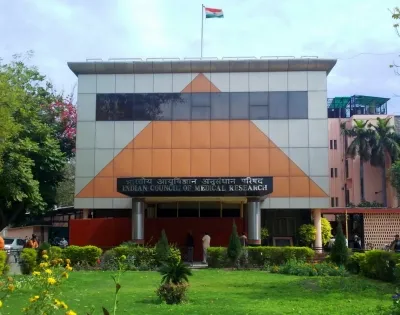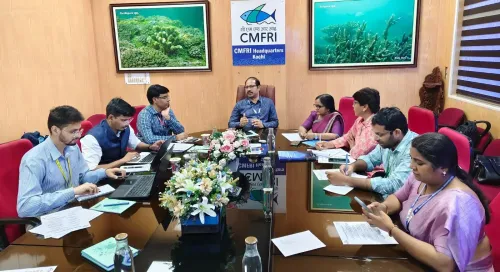How Are ICMR's Affordable Test Kits Enhancing Diagnosis of Genetic Blood Disorders in India?

Synopsis
Key Takeaways
- ICMR's POC test kits are revolutionizing diagnostics.
- Cost-effective solutions are essential for healthcare access.
- Early detection can save lives and reduce healthcare costs.
- Indigenous innovation is paving the way for future advancements.
- Integration into national health programs enhances accessibility.
New Delhi, June 22 (NationPress) Innovative and cost-effective point-of-care (POC) testing kits, engineered by researchers at the Indian Council of Medical Research (ICMR), are revolutionizing the diagnosis of genetic blood disorders such as Haemophilia A, von Willebrand disease (VWD), and sickle cell disease (SCD) across India.
Haemophilia A, VWD, and SCD are serious hereditary bleeding disorders that frequently remain undiagnosed due to the high costs of testing and limited availability at specialized medical centers.
In India, the burden of Haemophilia A is considerable, with estimates indicating that approximately 136,000 individuals are affected, yet only a small proportion are diagnosed and documented.
The estimated prevalence of VWD in India is around 1 in 12,000 in certain areas, with limited studies indicating a 10 percent occurrence among inherited bleeding disorders.
As for SCD, it is particularly widespread in India, especially in tribal communities (57%), and also affects non-tribal populations (43%).
“We now have several tests developed in India that can accurately diagnose blood disorders. This is a source of pride for all of us,” stated Dr. Manisha Madkaikar, Director of the ICMR-Centre for Research, Management, and Control of Haemoglobinopathies (CRMCH) located in Chandrapur district, Maharashtra, in an interview with IANS.
The ICMR-National Institute of Immunohaematology (NIIH) has created a POC testing kit for diagnosing Haemophilia A and VWD, which is suitable for use at primary health centres (PHCs), thus bringing diagnostic services closer to those in need.
Remarkably, “the POC test is priced at just Rs 582 per patient, whereas traditional lab tests amount to approximately Rs 2,086. This kit could potentially identify over 83,000 undiagnosed cases,” Madkaikar explained, adding that the kits could “save the healthcare system around Rs 42 crore—three times cheaper than the existing method.”
These tests are being incorporated into the national health initiative at the PHC level across various states.
“Utilizing these affordable POC kits at PHCs and other local health facilities can facilitate early detection and treatment of bleeding disorders, enhance patient outcomes, and significantly reduce healthcare expenses,” the senior scientist emphasized.
Moreover, “the World Federation for Hemophilia has expressed interest in acquiring these tests for implementation in countries with a high prevalence of these diseases,” Madkaikar noted.
Furthermore, to bolster the battle against SCD, ICMR-NIIH in Mumbai and CRMCH in Chhattisgarh have been officially designated by the government to test and certify new diagnostic kits.
“To date, they have evaluated and approved 30 different kits, including simple on-the-spot tests (like finger-prick tests), lab-based tests like HPLC, and tests that identify the disease at the genetic level,” said Madkaikar, adding that these test kits could play a crucial role in the national screening program for SCD, targeting a population of 70 million in the country.
While the preliminary manufacturer's quote for the diagnostic test was Rs 350 per test, a comprehensive review by ICMR established that POC tests for sickle cell disease/trait among high-risk groups in India would be cost-effective if sourced at Rs 100 per test or less.
Consequently, the newly validated kits by ICMR-NIIH are priced at under Rs 50 per test.
“At the inception of the national sickle cell elimination mission, we had merely two point-of-care tests recommended under the program, both of which were externally sourced at nearly Rs 350.
“Now, various indigenous companies have developed their own point-of-care tests. We now have a range of tests available, from solubility tests to point-of-care and molecular diagnostics—all produced in India and readily accessible,” the scientist concluded.









